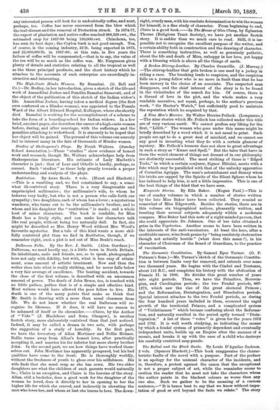Dalbroom Folks. By the Rev. J. Smith. (Alex. Gardner.)- Dalbroom,
we need hardly say, is a little town in North Britain. Its inhabitants, male and female, are, so to speak, photographed here not only with fidelity, but with, what is less easy of attain- ment, some amount of artistic treatment. Now and then the writer rises into what is really striking, and he never falls below a very fair average of excellence. The boating accident, towards the close of the first volume, is described with an uncommon amount of power. The death of John Bruce, too, is touched with no little pathos, pathos that is of a simple and effective kind. Most writers would have allowed the poor fellow to live. His death is one of the many points that make us think that Mr. Smith is drawing with a more than usual closeness from life. We do not know whether the real Dalbroom will re- cognise its likeness. If it does, it will have no reason to be ashamed of itself or its chronicler.—Claire, by the Author of " Vida " (J. Maclehose and Sons, Glasgow), is another Scotch story, more elaborately contrived than that just noticed. Indeed, it may be called a drama in two acts, with perhaps the suggestion of a study of heredity. In the first part, we have the love-story of Allan Mortimer and Nellie Holmes. Nellie turns away from Allan's honest love, after practically accepting it, and marries his far inferior but more showy brother John. In the second part, we see how things have worked them- selves out. John Mortimer has apparently prospered, but his bad qualities have come to the front. He is thoroughly worldly, without the freshness of youth to gloss over his selfishness. His wife finds that she must reap as she has sown. His two elder daughters are what the children of such parents would naturally be ; Claire is an exception, and Claire is the heroine of the story. Allan, still a bachelor, does a good work for the daughter of the woman be loved, does it directly to her in opening to her the higher life for which she craved, and indirectly in elevating the man who loves her, and whom at last she learns to love. The down- right, sturdy man, with his resolute determination to win the woman for himself, is a fine study of character. From beginning to end, Claire is a good book.—In The Manse of Glen Cluny, by Eglanton Thorne (Religious Tract Society), we have yet another Scotch story. It is sadder than we much care to read. Still, it is im- possible not to recognise the excellent purpose of the writer, and a certain ability both in construction and the drawing of character. There is something instructive, as well as genuinely pathetic, about the life and death of Mira, unhappy in her love, yet happy with a blessing which is above all the things of earth.


















































 Previous page
Previous page